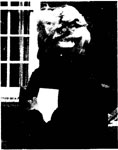
I never saw any of the kids again (I knew I wouldn’t, that was partly why it was so hard to say good-bye); but later, I went back to Sibton Park and saw Marza.
Her hair was white, not gray; but other than that, she was the same. I thanked her as well as I could for what she and Sibton Park had shown me and taught me and meant to me, and she said (she was always so polite), “You make it all seem worthwhile.”

Marza as she looked the last time I saw her. I didn’t think to take a picture: the photograph is from the school newspaper.
I went into the Night Nursery, and our study, and the passage where we lined up for meals. The macs and Wellingtons looked just the same; and so did the floor, where all those feet over the years had worn down the bricks. But the walls were different: they were covered with framed photographs, including one of the whole school my first term there.
It wasn’t faded or blurry, the images were sharp and clear, the paper glossy white. Maybe it was the pose (everyone so straight), or the composition (exactly centered), or maybe just an old lens or paper or process that produced perfectly focused, fine-grained pictures, with glossy whites and gleaming blacks and grays. But obviously, the photograph was from the past, and as clearly focused as a view through a telescope.
We were in the Lower Garden, where we had stories in summer, wearing our striped summer dresses. We were in three rows: the littlest children cross-legged on the grass, the middle ones in chairs behind them, the biggest ones standing up behind them. Everyone sat, or stood, very straight, with her hands neatly folded in her lap, smiling politely — everyone except one child in the front row. That child was sprawled on the grass, chin up, staring into the camera, not exactly smiling, but not sad, either — confident, even defiant, ready for anything: “Go ahead — just try and make me do it.” She looked as if she’d be glad to fight anyone who tried to make her do anything, but was pretty sure no one would try. I thought she looked spunky and very American. That was me, when I first went to Sibton Park, before I learned to think about other people and care what they thought about me.
Temper
“Blow out the light,” they said, they said,
(She’d got to the very last page);
“Blow out the light,” they said, they said,
“It’s dreadfully wicked to read in bed!”
Her eyes grew black and her face got red
And she blew in a terrible rage.
She put out the moon, she did, she did,
So frightfully hard she blew,
She put out the moon, she did, she did …
— Rose Fyleman